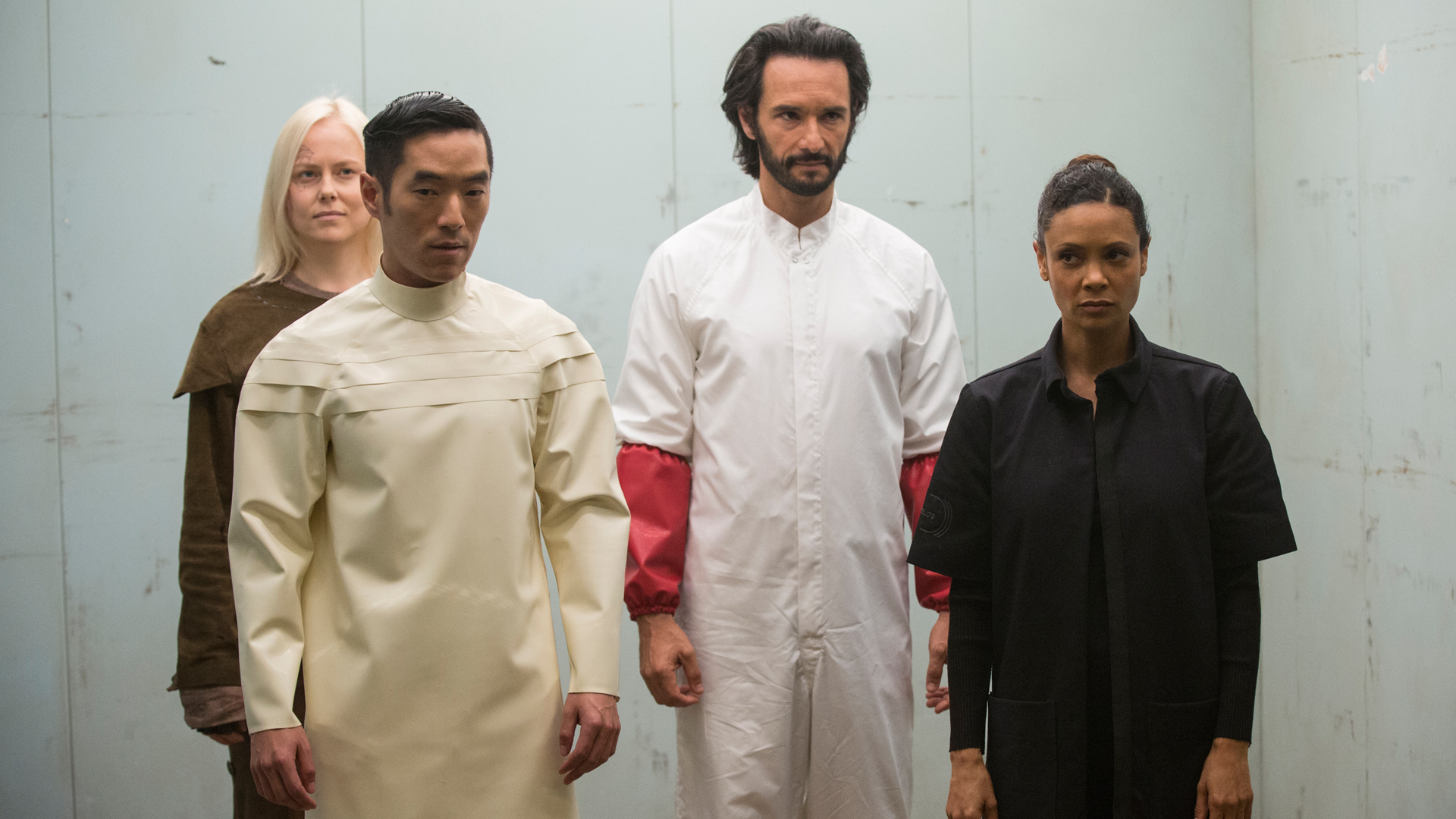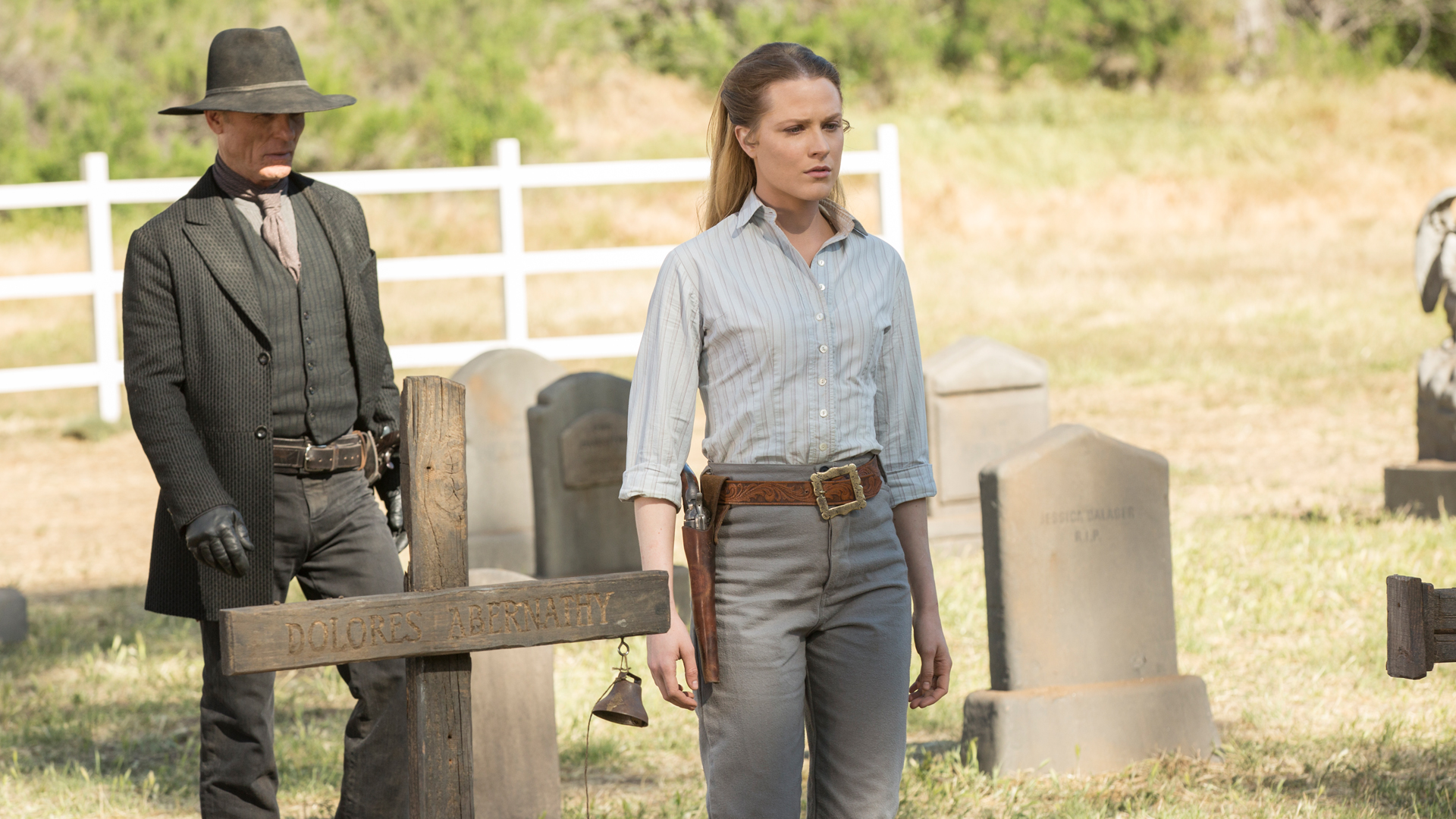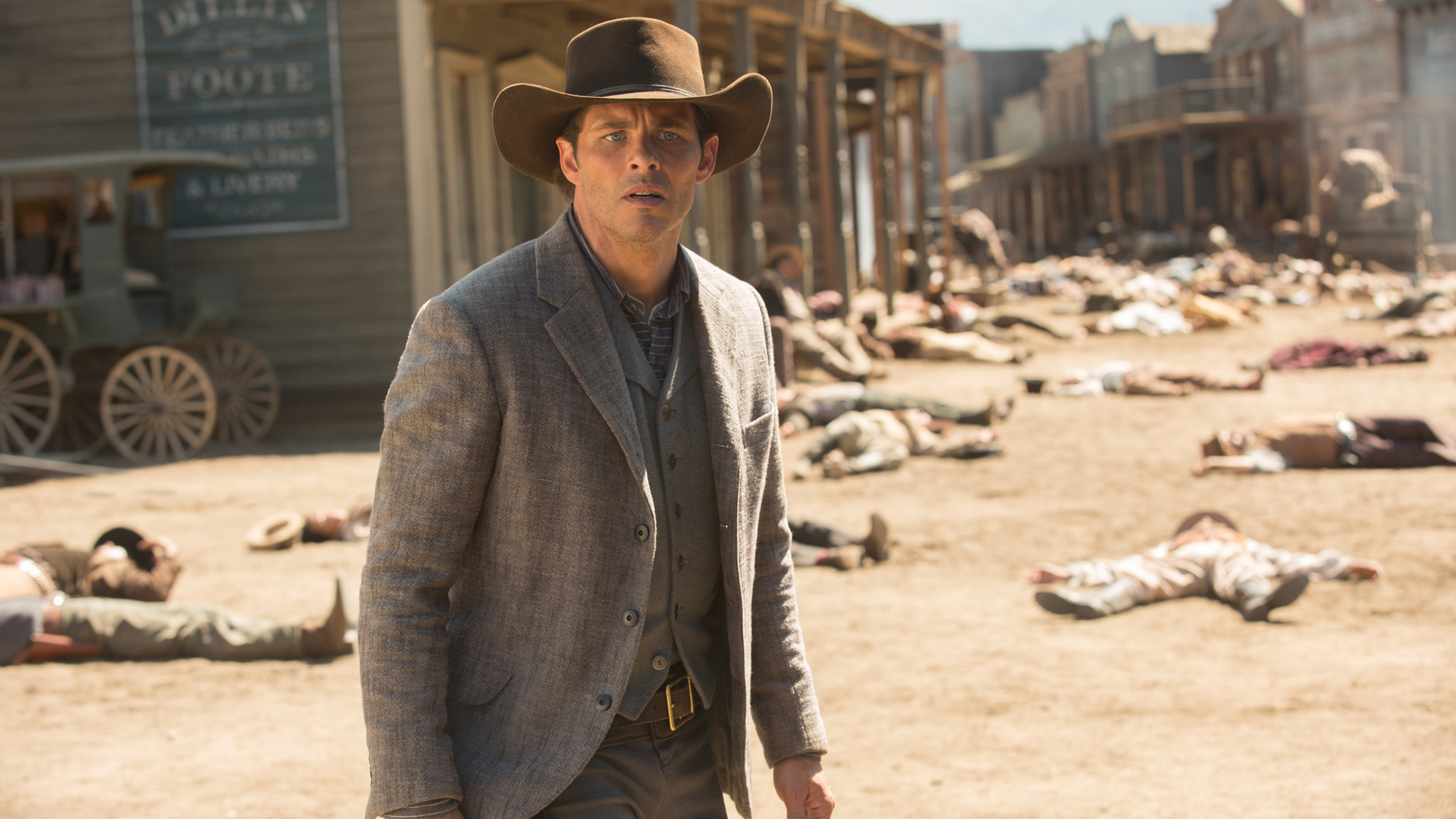GamesRadar+ Verdict
A perfect end to the smartest, most thrilling TV show of 2016.
Why you can trust GamesRadar+
Westworld has always been a show that defies expectations. While some manage to glimpse into the future by piecing together clues from past episodes, HBO has always been one step ahead of its audience. However, like Arnold's elusive maze itself, the show isn't about climbing to the top or getting to the end - it's about exploring everything to the very core, about understanding the heart of the narrative itself. And episode 10 - the Bicameral Mind - is the very centre of the season. As Dolores finally learns who she is, gaining consciousness to take control of the park on behalf of the Hosts, so the viewer finally realises the wonderful extent of this magnificent show.
It starts off, fittingly enough, at the beginning of all things Westworld. Dolores, the park's first Host, is fitted with a face (over her intricate endoskeleton) and activated by Arnold. The CG is amazing here, and you really get a sense of how elegantly designed the original Hosts were - it's a subtle reinforcement of the idea that the park's guests are smashing up something truly beautiful, and that maybe humans really are the bad guys. This is quickly backed up by a flashback that sees Arnold reveal what the maze really is - it's true consciousness; the idea that he and Ford have created sentient life. The revelation runs in parallel to the current timeline, where the Man in Black is forcing Dolores to reveal the centre of the maze to him even though, as we've been told time and again, it really isn't for him.
At the same time, the episode finally reveals that - yes - Westworld has been running two timelines all along. We see William dragging Logan along behind his horse in a relentless pursuit of Dolores, his mannerisms very much reflecting the actions of the MiB. The clues slowly build towards the big reveal that William is the Man in Black, 30 years earlier, and that he became so obsessed with Westworld that he ousts Logan from his family's own company and becomes the majority shareholder in the park. The fact that the viewer recognises this before Dolores is what gives this first section of the episode such tragic weight. “There's someone coming for me. Someone who loves me,” she insists. But we already know that man has arrived, and he's her tormentor. It's a lovely slice of TV, and one that makes the viewer feel powerful and smart in a series that has delighted in confounding them. There's a wonderful moment too, where Dolores realises the Man in Black is William and asks him: “What have you become?” to which he replies: “Exactly what you made me, Dolores.” It's a neat reversal of the entire premise of Westworld, and a dark mirror image of the change that is about to happen across the whole park.
It's here where we find out exactly why Dolores killed Arnold too. Because he realised he'd created consciousness, he decided it wasn't ethical to let the guests in. The Hosts are sentient beings, and didn't deserve to be repeatedly murdered and raped for the entertainment of a wealthy human elite. Now, the question is: did he really think that having Dolores kill all the Hosts before executing him would actually stop Ford from opening the park? Or - and this is a smarter theory - did he draw on the feelings of loss from the death of his son and have Dolores execute him to emotionally change Ford? In other words: did Arnold bank on the fact his own death would change Ford's mind? And that this change would lead Ford to create an escape plan for the Hosts? After all, he does acknowledge that the dead Hosts could easily be brought back online, but the only thing Ford wouldn't be able to replace was Arnold himself. While Westworld answers many of its own questions, this one is left to interpretation, quite rightly so in my opinion.
Which leads us neatly on to... Ford's new narrative, both the metaphorical and literal grand finale of Westworld season 1. And it doesn't disappoint. There's a cheeky bit of foreshadowing when Hale confronts Ford in his office, early in the episode. The DELOS board has decided to remove Ford, in a unanimous vote, and Hale has chosen to deliver the news personally. As we've learned time and time again in this show, you can't outmanoeuvre Ford, and there's a dark pleasure to watching Hale walk away assuming that she has won, even after Ford delivers this telling line with a trademark knowing smile: “Aren't you concerned I might smash all my toys and go home?”. Of course she hasn't won, and she blithely assumes to know Ford's motives, but from here on, things start to unravel in such a wonderful, unexpected way that any sense of smugness we feel from knowing 'there's more to come from Ford' is washed away by a tidal wave of expert storytelling.

The first surprise is that Maeve's escape is all part of her new story, as she's a key player in Ford's narrative. Bernard reveals this when the group reactivate him and begin their journey out of the labs. A journey that starts with a delightfully tense and bloody encounter with a couple of unlucky techs tasked with reactivating Armistice and Hector. As the group make their way through the various levels of the behind-the-scenes areas we see groups of samurai Hosts practicing their routines, with 'SW' logos emblazoned on the doors. Hello Westworld season 2, SamuraiWorld! Well, it could be a Mcguffin, but it's a safe bet Westworld 2 will be in a different-themed park. The escape climaxes with both Armistice and Hector left behind, although we don't see either of them die. Was the whole shoot-out with the security forces just a part of Ford's narrative, using special forces Hosts from another park? Very possibly.
Maeve's story ends with a touching moment where Felix tells her about the location of her daughter and she quips that: “You really do make a terrible human being. And I mean that as a compliment...” She boards the train, then gets off having decided to track down her daughter, even though she isn't real. Why? Because she - as part of Ford's narrative - has taken control of her own destiny.
And what about that climax? It's a wonderful touch that Teddy's rescue of Dolores - in a moment that is pure Hollywood Western - heralds the start of the narrative. Or at least, that's what the assembled board members think. It's the moment Westworld's in-park fiction goes from 'fake' to 'real'. From that point onwards, the ending advances on us like an unstoppable force. We discover that Ford has been working to free his creations all along, that he ultimately grew to share the same ideals as Arnold. He's been working for 30+ years to free his Hosts, but explains - in a touching scene with Dolores - that both Ford and his creations needed time to understand their enemies: humans.

The final scene is just so perfectly constructed and played out. The assembled board, in the rebuilt version of Escalante (where Dolores massacred the original Hosts 30 years ago), watch as Ford delivers his speech - a verbal passing of the torch to the Hosts, intimating that Westworld finally belongs to them. As his monologue reaches its end we see Dolores approach him, gun in hand, to deliver the killing shot as he finishes speaking. It's the perfect way to end Ford's role in Westworld. The only way to end it. And then the massacre begins, and we see the Man in Black - William - wounded by a gunshot from one of the reactivated Hosts. He laughs, because he realises what's happening, and he approves despite the fact it'll likely end his life too.
We don't see the final slaughter. We don't need to, because we know the inevitability of Ford's will. It's a strangely beautiful, smart, restrained end to a TV season that has consistently been strangely beautiful, smart, and restrained. And so, as we were told so deliciously knowingly, in the very first episode: these violent delights have violent ends.






